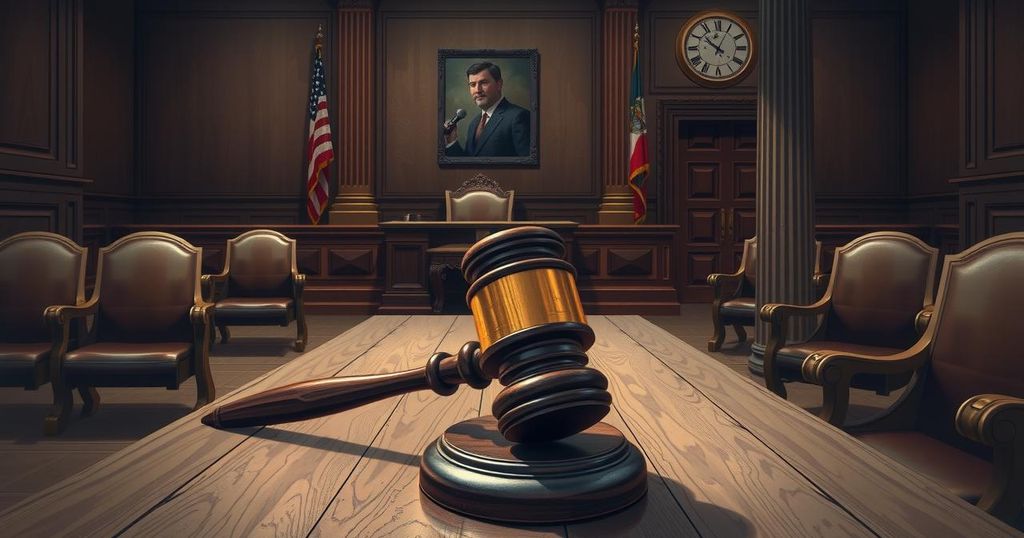Gambian Torture Survivors Testify Against Military Officer in Denver Trial
Pharing Sanyang testified in Denver against Michael Sang Correa, a former member of Gambia’s military, recounting extreme torture he suffered in 2006. This trial stems from Correa’s 2020 indictment under U.S. law for overseas torture. Witnesses detailed their traumatic experiences, reinforcing the call for accountability regarding human rights abuses committed under Yahya Jammeh’s regime.
In a significant trial that has captured attention, Pharing Sanyang, a former Gambian military officer, testified in federal court in Denver on Thursday about the brutal torture he endured almost two decades ago. Sanyang recounted harrowing experiences of being beaten with pipes and branches, pistol-whipped, and even struck in the face with a hammer, leaving him with enduring physical damage. His eyes, he explained, were injured by particles from the sandy courtyard where he was assaulted during a series of beatings in 2006, necessitating multiple surgeries.
Sanyang took the stand against Michael Sang Correa, one of the individuals he alleges tortured him. Correa is currently on trial for his role in torturing Sanyang and four other alleged coup conspirators while part of the Junglers, a military group accountable to Yahya Jammeh, Gambia’s long-time ruler. Correa was indicted in 2020 under a unique U.S. law that allows for the prosecution of individuals for torture committed elsewhere.
Sanyang detailed how he ultimately signed a false confession, but marked the document with his blood to signify the torture he had endured. After declining to confess on camera, he faced more torture, including electric shocks from wires attached to a wall socket. Sanyang described the painful moment when he read his confession for the cameras, with only audio recorded to hide his visible torment. “I had to save my body,” he stated, emphasizing that he had not actively participated in the attempted coup against Jammeh.
Spending nearly a decade imprisoned for treason, Sanyang escaped to Senegal after his release. In December 2016, Correa entered the U.S. as a bodyguard for Jammeh, subsequently overstaying his visa following Jammeh’s ousting in 2017. Prosecutors revealed that Correa has since been living in Denver, working as a day laborer.
This trial has brought together several alleged victims, who have traveled from various regions, including Gambia and Europe, to testify. Prosecutors displayed photographs to jurors showing victims’ scars from torture instruments like bayonets and cigarettes. The experiences detailed by the witnesses were shocking; for instance, Demba Dem testified about being subjected to suffocation and beatings.
Dem, who once served in the Gambian parliament, described the abuse he suffered, including being hanged upside down and beaten, illustrating the terror he and others faced. After seeking asylum in the Netherlands, he now struggles with PTSD yet expressed a sense of satisfaction from holding one of his abusers accountable in court. “I have to do it but I feel satisfied,” he mentioned.
As the trial progresses into next week, it highlights the ongoing quest for accountability for atrocities committed under Jammeh’s rule. In 2021, Gambian officials called for the prosecution of those responsible for crimes during his regime. Efforts to pursue justice have extended beyond the U.S., with notable cases in Swiss and German courts in recent years, leading to significant sentences for those involved in similarly heinous acts.
Pharing Sanyang’s testimony in Denver sheds light on the severe human rights abuses inflicted during Yahya Jammeh’s regime in Gambia. The trial against Michael Sang Correa not only aims to bring justice for the torture endured by Sanyang and others but also reflects a broader movement for accountability regarding past atrocities. As victims continue to share their stories, the hope remains that such trials will further the push for justice both in Gambia and internationally.
Original Source: www.denverpost.com




Post Comment